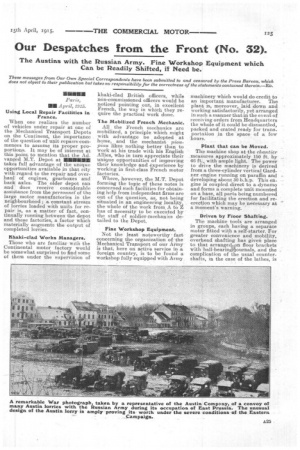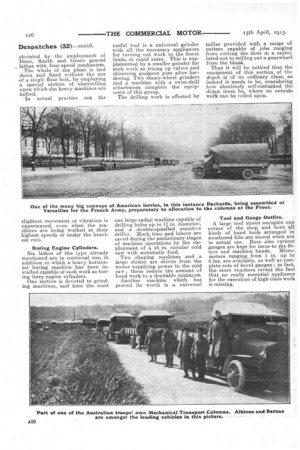Our Despatches from the Front (No. 52).
Page 5

Page 6

If you've noticed an error in this article please click here to report it so we can fix it.
The Austins with the Russian Army. Fine Workshop Equipment which Can be Readily Shifted, if Need be.
These messages from Our Own Special Correspondents have been submitted to and censored by the Press Bureau, which does not object to their publication but takes no responsibility for the correctness of the statements contained therein,--ED.
Paris, EMI April, 1915.
Using Local Repair Facilities in France.
When one realizes the number of vehicles under repair at one of the Mechanical Transport Depots on the Continent, the importance of the question of unit. repairs commences to assume its proper proportions. It may be of interest at this point to mention that the Advanced M.T. Depot at 111111111111111 takes full advantage of the unique opportunities available in that city with regard to the repair and overhaul of engines, gearboxes and back axles. The older depot can and does receive considerable assistance from the personnel of the large motor manufactories in the neighbourhood ; a constant stream of lorries loaded with units for repair is, as a matter of fact, continually running, between the depot and these factories, a factor which materially augments the output of completed lorries. .
Khaki-clad Works Managers.
Those who are familiar with the Continental motor factory would be somewhat surprised to find some of them tinder the supervision of
khaki-clad British officers, while non-commissioned officers would be noticed pointing outs in excellent French, the way in which they require the practical work done.
The Mobilized French Mechanic.
All the French mechanics are mobilized, a principle which might with advantage be adopted at home, and the mechanist pionpion likes nothing better than to work at his trade with his English Allies, who in turn appreciate their unique opportunities of improving their knowledge and experience by working in first-class French motor. factories.
Where, however, the M.T. Depot forming the topic of these notes is concerned such facilities for obtaining help from independent firms are out of the question, as, not being situated in an engineering locality, the whole of the work from A to Z has of necessity to be executed by the staff of soldier-mechanics detailed to the Depot.
Fine Workshop Equipment.
Not the leastnoteworthy fact concerning the organization of the Mechanical Transport of our Army is that, here on active service in a foreign country, is to be found a workshop fully equipped with Army
machinery which would do credit to an important manufacturer. The plant is, moreover, laid down and working satisfactorily, yet arranged in such a manner that in the event of receiving orders from Headquarters the whole of it could be dismantled, packed and crated ready for transportation in the space of a few hours.
Plant that can be Moved.
The machine shop at the than tier measures approximately 150 ft. by ft., with ample light. The power to drive the machinery is derived from a three-cylinder vertical Gardner engine running on paraffin and developing about 30 b.h.p. This engine is coupled direct to a dynamo and forms a complete unit mounted on a base, all parts being numbered for facilitating the erection and reerection which may be .necessary at a moment's warning.'
Driven by Fioor Shafting.
The machine tools are arranged in groups, each having a separate motor fitted with a self-starter. For greater convenience and mobility, overhead shafting has given place to that arrangedhon floor brackets with .ball-bearingitournals, and the complication of the usual countershafts, in the case of the lathes, is
Despatches (32)—contd.
obviated by the employment of Dean, Smith and Grace geared lathes with four-speed mechanism. The whole of the plant is laid down and fixed without the use of a single floor bolt, by employing a special section of channelling upon which the heavy machines are bolted. In actual practice not the
slightest movement or vibration is experienced, even when the machines are being worked at their highest speeds or under the heaviest cuts.
Boring Engine Cylinders.
Six lathes of the type already mentioned are in continual use, in addition to which a heavy horizontal boring machine has been installed capable of such work as boring lorry-engine cylinders. One section is devoted to grinding machines, and here the most useful tool is a universal grinder with all the necessary appliances for turning out work to the finest limits at rapid rates. This is supplemented by a smaller grinder for such work as truing up valves and skimming gudgeon pins after hardening. Two emery-wheel grinders and a machine with a twist-drill attachment complete the equipment of this group. The drilling work is effected by one large radial machine capable of drilling holes up to lt in. diameter, and a double-spindled sensitive driller. Much time and labour are saved during the preliminary stages of machine operations by the employment of a 16 in_ circular cold saw with automatic feed.
Two shaping machines and a large slotter are driven from the motor supplying power to the cold saw ; these reduce the amount of hand work to a desirable minimum. Another machine which has proved its worth is a universal miller provided with a range of cutters capable of jobs ranging from cutting the slots in a castellated nut to milling out a gearwheel from the blank.
Thus it will be noticed that the equipment of this section of the depot is of no ordinary class, as indeed it needs to be, considering low absolutely self-contained the depot must be, where no outside work can be relied upon.
Tool and Gauge Outfits.
A large tool stores occupies one corner of the shop and here all kinds of hand tools arranged in numbered kits are stored when not in actual use. Here also various gauges are kept for issue to the fit tom and machine hands. Micrometers ranging from 1 in. up to 6 ins, are available, as well as corn= plete sets of bevel gauges ; in fact, the store vouchers reveal the fact that no really essential appliance for the execution of high-class work is missing.




















